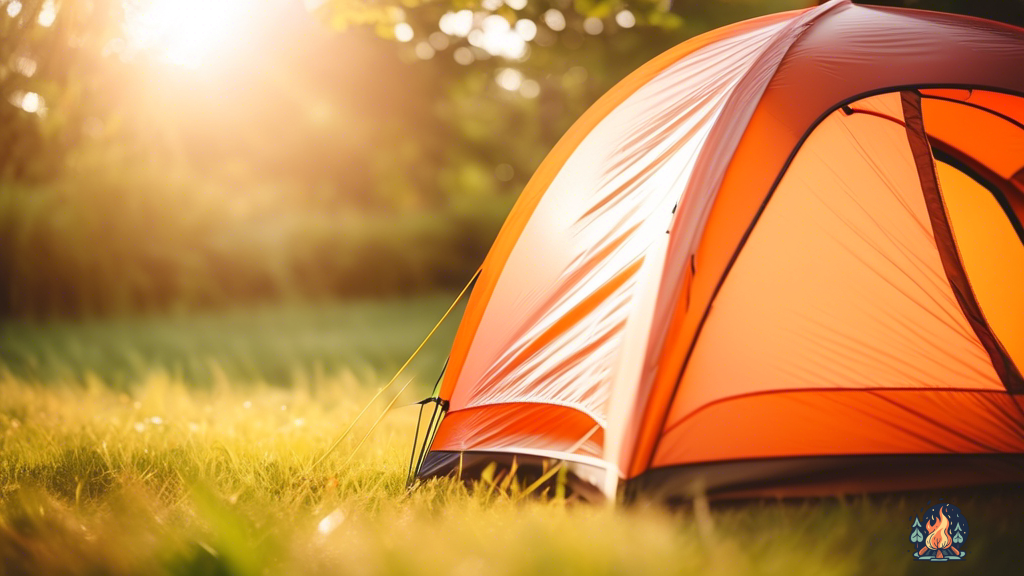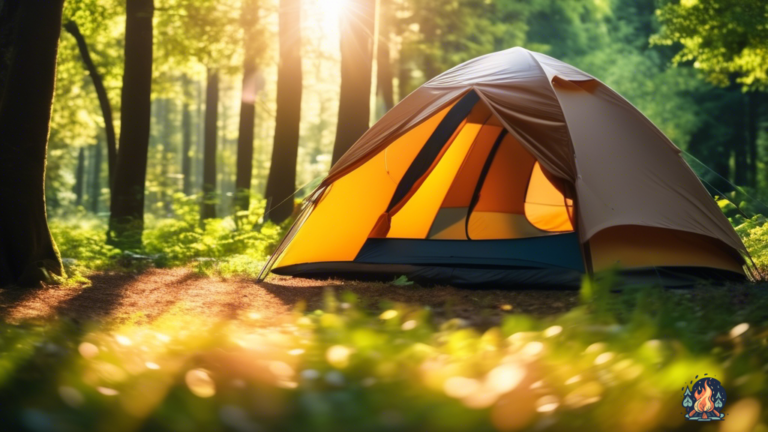Tent Materials Explained: Finding The Perfect Fabric For Your Tent
by Kevin Fairbanks • Updated: February 21, 2024
Uncover the secrets of tent materials explained for your next camping trip. From durable fabrics to weather-resistant options, find the perfect fabric for your tent and be ready for any adventure that comes your way. Upgrade your gear now!

When it comes to choosing the perfect fabric for your tent, you want to ensure you have the right balance of durability, weight, and weather resistance.
With a plethora of options available, it can be overwhelming to decide which material is best suited for your outdoor adventures.
From the lightweight and durable nylon to the traditional and heavy-duty canvas, each fabric has its own set of benefits and drawbacks.
In this guide, we will explore the various tent materials to help you make an informed decision and find the perfect fabric for your tent.
Whether you’re a seasoned camper or a novice looking to explore the great outdoors, understanding the different tent materials is crucial in creating a comfortable and reliable shelter.
From polyester, a water-resistant and affordable choice, to polyethylene, a budget-friendly and waterproof solution, each fabric offers unique features to meet your camping needs.
By delving into the world of tent materials, you can find the perfect balance between performance and cost, allowing you to enjoy the freedom of the outdoors without worrying about the durability of your shelter.
Key Takeaways
- Consider factors like durability, weight, and weather resistance when choosing tent fabric
- Different types of tent materials include nylon, polyester, canvas, polyethylene, and Gore-Tex
- Understanding tent materials is crucial for creating a comfortable and reliable shelter
- Gore-Tex is a high-performance material ideal for extreme conditions, offering waterproof, breathable, and windproof properties
Nylon: Lightweight and Durable Option
When it comes to tent materials, nylon stands out as a lightweight and durable option that is perfect for backpackers on the go.
Picture yourself, setting off on a rugged adventure into the wilderness, carrying only what you need on your back. With a tent made of nylon, you can move swiftly and effortlessly through the trails, knowing that your shelter is as light as a feather yet tough enough to withstand the elements.
Nylon tent fabrics are designed to provide you with the ultimate freedom to explore without being weighed down by heavy gear.
Imagine yourself pitching your nylon tent at the end of a long day of hiking, feeling the satisfaction of a well-deserved rest in a reliable and sturdy shelter.
Embrace the sense of liberation that comes with choosing a material that allows you to wander further and faster, knowing that your tent can keep up with your adventurous spirit.
Polyester: Water-Resistant and Affordable Choice
Looking for an affordable option that is water-resistant? Polyester is the way to go! This versatile fabric is perfect for those who love to roam free without worrying about the weather.
With its water-resistant properties, polyester will keep you dry and comfortable during your outdoor adventures, whether it’s a light drizzle or a heavy downpour.
Not only is polyester a practical choice for your tent, but it’s also budget-friendly. You don’t have to break the bank to enjoy the benefits of a water-resistant material.
So go ahead, embrace the freedom of the great outdoors with a polyester tent that will keep you protected without weighing you down financially.
Canvas: Traditional and Heavy-Duty Material
Canvas is a durable and classic choice for tents due to its traditional and heavy-duty nature.
When you think of canvas, you might picture a rugged explorer setting up camp in the wilderness, with a sturdy tent that can withstand any weather condition. That’s the beauty of canvas – it’s reliable and tough, providing you with a sense of security and protection during your outdoor adventures.
While canvas tents may be heavier than other materials, they offer excellent breathability and insulation, keeping you comfortable no matter the temperature outside.
The natural fibers in canvas also make it a more sustainable option compared to synthetic materials, appealing to your inner eco-conscious nature.
So, if you’re looking for a tent material that exudes durability and timelessness, canvas is the perfect choice for you.
Polyethylene: Budget-Friendly and Waterproof Solution
Polyethylene offers a cost-effective and waterproof solution for shelter needs. This material is perfect for those who value practicality without compromising on quality. Here are three reasons why polyethylene might be the ideal choice for your tent:
- Affordability: Polyethylene is known for being budget-friendly, making it a great option for campers or outdoor enthusiasts who want a reliable shelter without breaking the bank.
- Waterproof: One of the key advantages of polyethylene is its waterproof properties. You can rest assured that your tent will keep you dry even during heavy rain showers, allowing you to enjoy the great outdoors without worrying about getting wet.
- Lightweight: Compared to other materials, polyethylene is lightweight, making it easy to transport and set up. This feature gives you the freedom to explore different camping locations without feeling weighed down by heavy equipment. With polyethylene, you can pack up and go wherever the adventure takes you.
Gore-Tex: High-Performance Fabric for Extreme Conditions
You’ll love the high-performance capabilities of Gore-Tex, perfect for extreme conditions. When you’re out in the wild, facing unpredictable weather or harsh environments, Gore-Tex fabric will be your best companion. This advanced material is not only waterproof and windproof but also highly breathable, ensuring you stay dry and comfortable no matter what Mother Nature throws at you.
Here is a comparison table to help you understand why Gore-Tex is the top choice for extreme conditions:
| Gore-Tex | Traditional Fabric | |
|---|---|---|
| Waterproof | Yes | No |
| Breathable | Yes | No |
| Windproof | Yes | No |
With Gore-Tex, you can have the freedom to explore remote locations without worrying about your tent’s performance. This high-performance fabric will give you the confidence to push your limits and experience the great outdoors to the fullest.
Frequently Asked Questions
Can tents made from nylon, polyester, canvas, polyethylene, or Gore-Tex be repaired if they get damaged during use?
Yes, tents made from nylon, polyester, canvas, polyethylene, or Gore-Tex can be repaired if they get damaged during use. You have the freedom to mend tears or holes to prolong the life of your tent.
Are there any environmental considerations to take into account when choosing a tent material?
When choosing a tent material, consider the environmental impact. Opt for eco-friendly options like recycled polyester or organic cotton. Show Mother Nature some love while enjoying the great outdoors. Your planet thanks you.
How do the different tent materials perform in terms of UV resistance and color fading?
When it comes to UV resistance and color fading, nylon tents are like a sturdy ship in a storm, holding up against the elements with ease. They keep their vibrant colors under the harsh sun.
Are there any specific care instructions or maintenance tips for tents made from nylon, polyester, canvas, polyethylene, or Gore-Tex?
For nylon, polyester, canvas, polyethylene, and gore-tex tents, keep them clean and dry to prevent mold and mildew. Store them in a cool, dry place when not in use. Follow manufacturer’s instructions for best care.
Are there any specific safety concerns or precautions to keep in mind when using tents made from these different materials?
When using tents made from different materials, remember to respect their unique properties. Like a sailor navigating rough waters, be cautious with nylon’s flammability, polyester’s susceptibility to UV damage, canvas’s need for waterproofing, and gore-tex’s delicate care.

Hi, I’m Kevin, a lifelong camping enthusiast and the voice behind Campfire Discoveries. From tent to RV to cabin camping, I’ve explored it all. Join me as we share stories and tips around the campfire, deepening our connection with the great outdoors.
Keep Reading
-
Expert RV Travel Tips For A Smooth Journey
Unlock the secrets to a flawless RV journey with expert travel tips. Make lifelong memories on the road – click here for the ultimate RV travel tips now!
-
Tent With Blackout Technology: Sleep Better In The Outdoors
Experience the ultimate outdoor sleeping solution with a tent featuring blackout technology. Say goodbye to sleepless nights and hello to quality rest under the stars! Click here to upgrade your camping experience now.
-
Maintaining Your RV Water System: Tips And Tricks
Keep your RV water system running smoothly with our expert tips and tricks for maintenance. Don’t miss out on our essential guide! Click now to learn more about RV Water System Maintenance.



